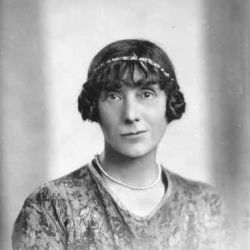
Jessie Pope
It is, perhaps, ironic that Jessie Pope should share her date of birth (although not the year) with Wilfred Owen, who vilified her and her type in his poem Dulce et Decorum Est. Her reputation today mainly persists due to Wilfred Owen’s original dedication of that poem to her, and his criticism therein of her type of poet, who glorified war, regardless of the consequences.
Prior to the war, Pope had been a published poet and author and, in common with many others in that profession, turned her hand to writing propaganda poetry. Such verse was widely read at the time, in newspapers and magazines, becoming enormously popular with the general public in the early stages of the conflict. Once the realities of the war began to hit home, however, Pope (unlike many others) ceased writing jingoistic poetry and returned to penning childrens’ stories.
Today, Jessie Pope’s poetry is often studied in schools alongside the work of Wilfred Owen, simply because of that original dedication. She was not a particularly fine poet: indeed her own self-effacing sense of humour left her in no doubt as to her poetic talents. However, she remains one of the most studied female war poets of that generation, thanks almost entirely to Wilfred Owen.
It must be said that when Pope was writing her war poetry, many male war poets were almost as jingoistic and fervent as she was in their messages and content. John McCrae, Rupert Brooke and Julian Grenfell, for example, were among the soldier-poets who wrote of the glories of war during its early stages. It seems, therefore, unfair to criticise Jessie Pope for repeating similar sentiments to these great names: a more justified commentary would be that their poetry is, quite simply better than hers.
Another censure which could be aimed at Pope, as opposed to the soldier-poets of the time, is that she was asking others to fight on her behalf, or as Helen Hamilton put it in The Jingo Woman:
“Can’t you see it isn’t decent,
To flout and goad men into doing,
What is not asked of you.”
However in this aspect, Jessie Pope was not alone. Many non-combatants of both sexes, wrote in the same tone throughout the war, including such literary giants as Rudyard Kipling, Thomas Hardy and Henry Newbolt.
It is really quite unreasonable to judge Pope’s poetry against that of Wilfred Owen: they are poets of different times. Pope wrote no war poetry after 1916; Owen only really began writing in this genre in 1917. Indeed, when we examine how Owen himself was writing at the beginning of the conflict, we discover that in The Ballad of Purchase Money, written in the autumn of 1914, he had written:
“O meet it is and passing sweet
To live in peace with others,
But sweeter still and far more meet
To die in war for brothers.”
Not only does this poem resonate with some of his later Latin tags which he used in Dulce et Decorum Est, it also reflects Owen’s feelings at the time, which would naturally change with his experiences. It must also be said that, in common with some of Pope’s verses, this particular poem simply isn’t very good.
By 1917, Owen was perfectly entitled to feel angry towards those at home who continued to perpetuate “The Old Lie”. However it is just as well that he decided, or was persuaded, to amend and then delete his personal dedication to Jessie Pope, since he would have been criticising her for the content of poems written two years prior to him writing Dulce et Decorum Est and indeed these were views which he can be shown to have shared.
Pope’s poetry is certainly not the greatest of her genre, but she did not claim to be great, or particularly talented. Nonetheless, within the context of that brief period of time at the beginning of the war, her poetry was popular and does provide us with a window into a world which, from a 21st century perspective, seems difficult to understand and appreciate. We should not criticise her for her opinions when they were, quite obviously, shared by many of her contemporaries and we certainly should not judge her just because Wilfred Owen chose to vilify her, despite his own previously held, but all-too-easily forgotten opinions.